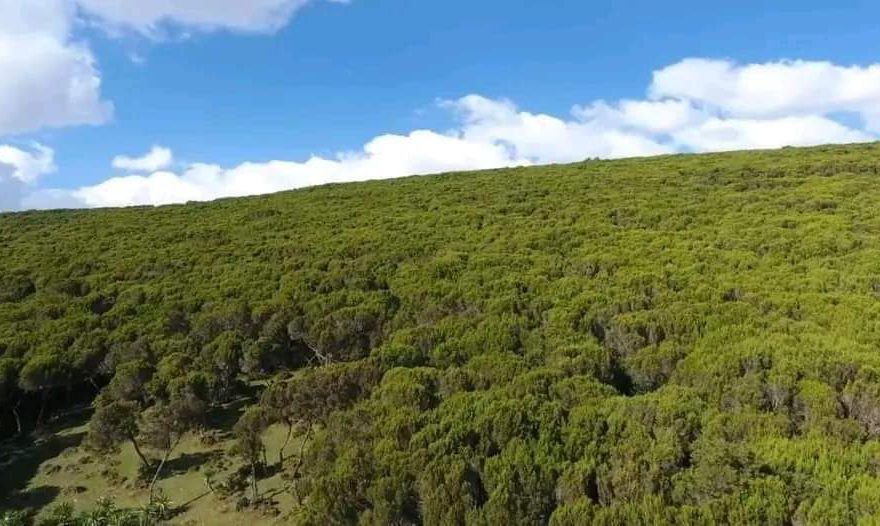
BY EPHREM ANDARGACHEW
Ethiopia has been striving to curb its greenhouse gas emissions by planting tree seedlings. The country is vulnerable to the impacts of climate change and the unpredictability of climate variability. Since the country is not a developed nation, it’s capacity to mitigate the negative effect of climate change has been constrained by limited livelihood options for the majority of the population, inadequate ability to withstand or absorb disasters, and the prevailing biophysical shocks it faces.
To address these challenges, there is a need for stronger climate change mitigation and adaptation initiative across the country. Among others, Green Legacy Initiative, which has been implemented since 2019, is worth mentioning. The main aim of the initiative is to build a green and climate-resilient economy.
The initiative is also imperative to reverse climate change impacts and environmental degradation that contributed to flooding, soil erosion, deforestation, and biodiversity loss. Moreover, it uses to combat the negative impact of climate change, drought, and desertification.
The initiative aimed to plant 20 billion tree seedlings from 2019 to 2022. Nonetheless, the country has achieved this by planting 25 billion tree seedlings which increase the forest coverage of the country. The initiative, apart from combating the negative effects of climate change, encourages people to plant fruit trees which supports ensuring food security and nutrition. It has been contributing to ensuring economic development and food security.
Indeed, climate change is a global and continental problem that requires collaborative and cross-border cooperation and responses. Hence, the green legacy initiative needs to be recognized by the international community and many environmental actors who want to duplicate the initiative and its objectives.
Taking the initiative as a stepping stone to a better future for Ethiopia, UNDP, on September 2022, explained its plan to share the Green Legacy Initiative achievements and experiences with about 10 countries. The initiative helps the Pan-African agenda since it sets the pace in combating climate change and fostering community resilience. Apart from fighting the negative effect of climate change, the initiative is important to strengthen regional cooperation.
South African Institute of International Affairs (SAIIA) Governance Resources Program Head Alex Benkenstein told local media that Ethiopia’s Green Legacy Initiative is a good practice to combat the effects of climate change. Its lessons and experiences should be shared and expanded to the broader region.
To share lessons from the good practices and expand them in other parts of the continent, it is important that civil societies and other regional institutions concerned with the issue of climate change do more tasks, he added.
Ethiopia, in its Green Legacy Initiative, has been conducting not only massive tree seedlings plantation campaigns but provided tree saplings to neighboring countries to combat the chronic effects of climate change both in the country and in the region in a collaborative way, he stated.
Ethiopian Deputy Prime Minister and Foreign Minister Demeke Mekonen noted that Ethiopia has been working on the Green Legacy Initiative and the advancement of renewable energy in the country. The ongoing efforts of the Green legacy initiative and the Grand Ethiopian Renaissance Dam (GERD) have demonstrated the commitment of Ethiopia to building a green economy and mitigating the negative effect of climate change.
On her part, the Executive Director of the United Nations Environment Program, Inger Andersen praised Ethiopia for its commendable efforts to realize a green economy. Besides, the UN will support the efforts of Ethiopia to encourage the development of renewable energy sources.
In fact, Ethiopia has gone long way in implementing both regional and international environmental agreements to mitigate the negative effect of climate change. This commitment should not be only acknowledged but requires support from all parties.
The advancement of renewable energy and the initiative requires support from bilateral and multilateral development partners. Because supporting the Initiative has an enormous advantage for national, regional, and international adaptation and mitigation of the harmful effects of climate change, biodiversity preservation, combating desertification, ensuring green development, guaranteeing food security, and achieving the SDGs, according to Deputy Prime Minister and Foreign Minister Demeke.
Ethiopian Ministry of Foreign Affairs State Minister Tesfaye Yilma said concerted efforts are needed to mitigate or tackle the growing climate-induced migration. Fostering common understanding as well as designing adaptive strategies and jointly implementing the strategies are of paramount contribution to addressing the challenge.
In this regard, Ethiopia is taking concrete steps to mitigate the impact of climate change on sustainable development, the state minister noted, adding that the country’s designed climate-resilient green economy strategy aims at addressing the challenges relating to climate change while pursuing sustainable economic growth. This can be copied by other countries as a model to combat the negative effect of climate change.
THE ETHIOPIAN HERALD SUNDAY EDITION 4 DECEMBER 2022




